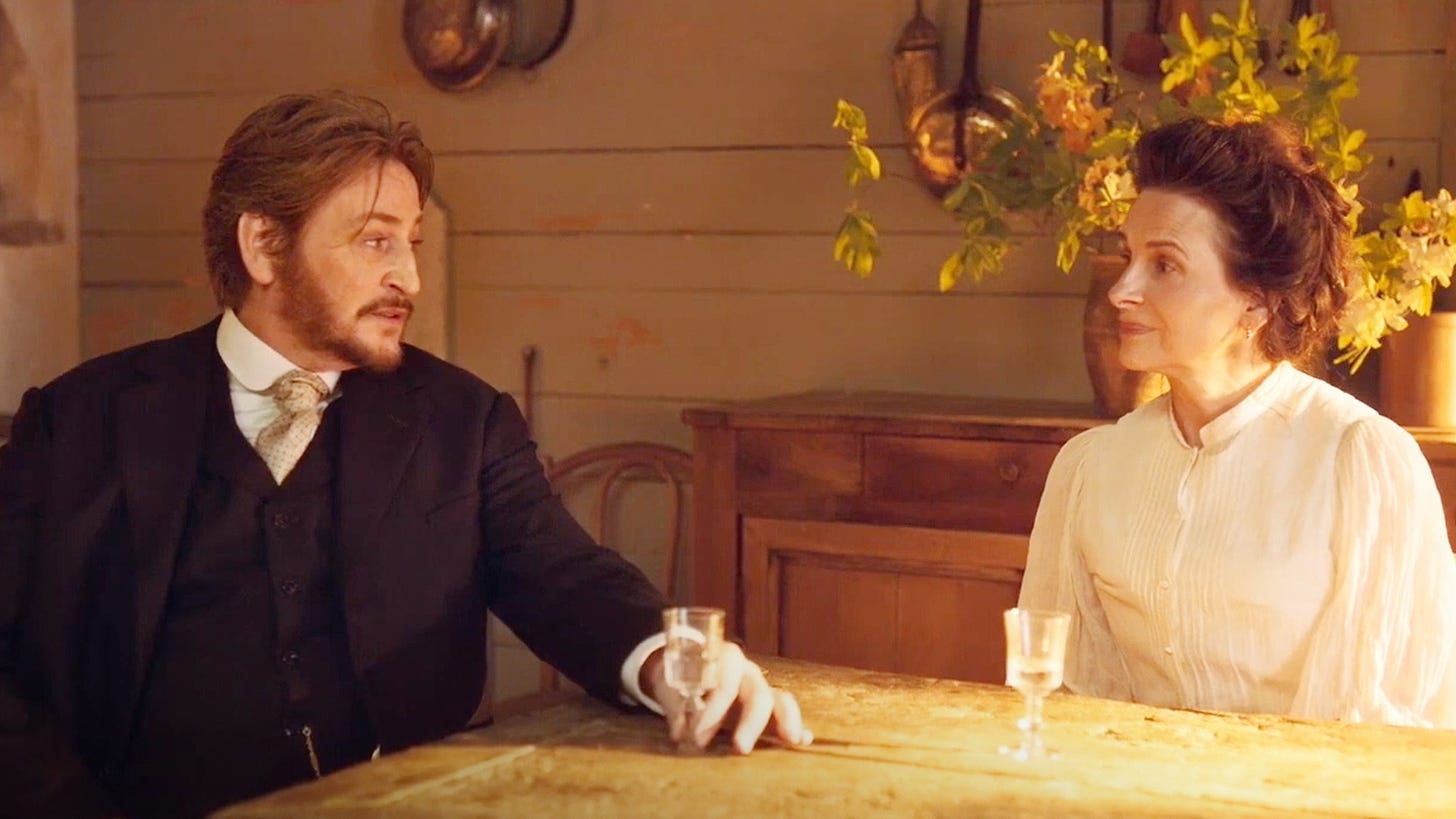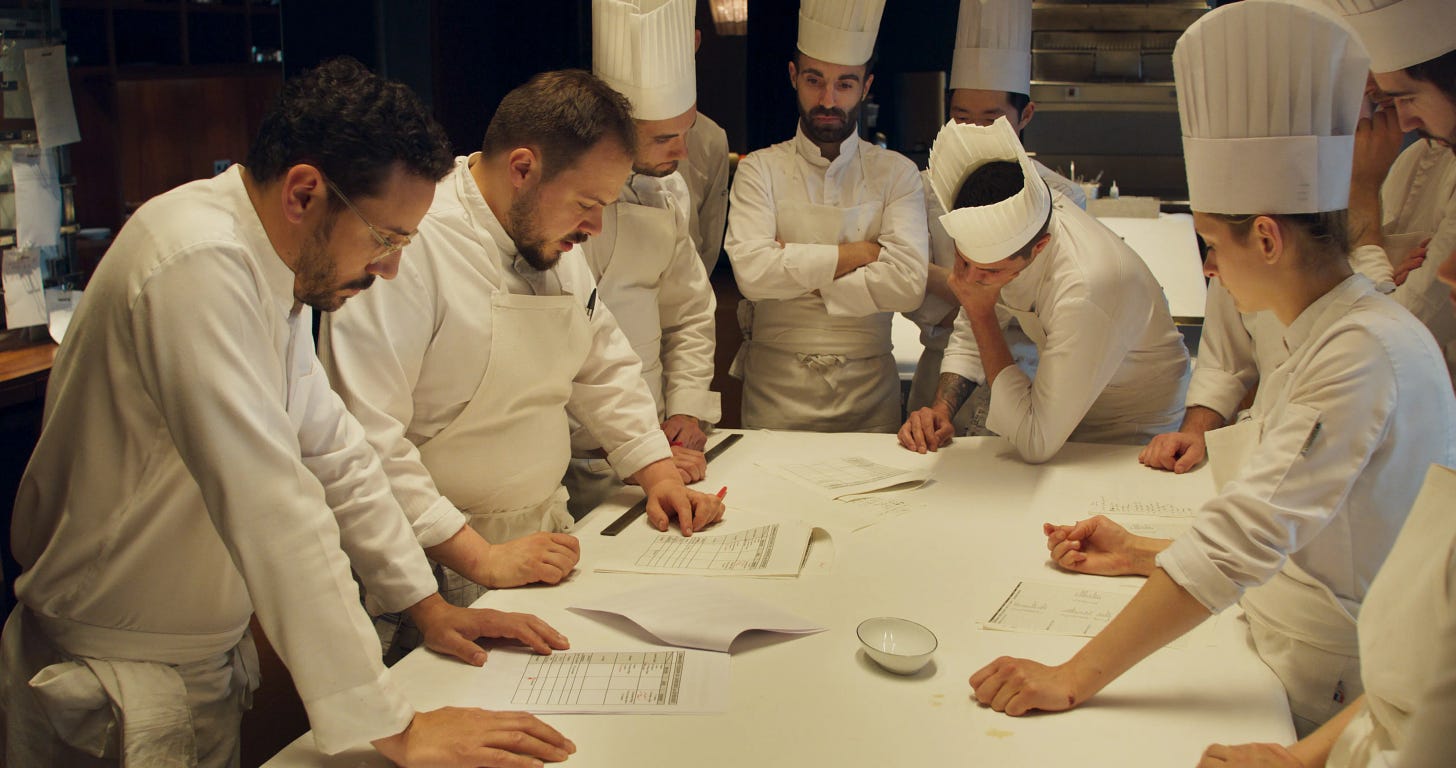Two of my favorite movies this year are about food: the art of preparing it, the act of enjoying it, and the ecosystems that enable us to experience eating. I guess one could argue that these films are bourgeois indulgences, but that’s a pretty boring take. And frankly, there’s so little to enjoy about the world, I rather be an aesthete for a goddamn minute.
—
The Taste of Things is a 19th century romance between gourmets Eugénie and Dodin, played by Juliette Binoche and Benoît Magimel (who were once together IRL and share a child). They live in rustic country estate and occupy their time developing recipes, curating menus, and hosting the local gentry for over-the-top meals. He’s in love with her, and she with him, but she refuses to marry. Binoche gives a breezy, sensual performance, and in the early moments of the film we see her playful when she rejects his proposal. Eugénie explains that she still would like to the right to refuse him entry into her bedroom at night, but we understand her will isn’t that strong. Perhaps she’s just waiting for the ultimate gesture?
Hanging over their romance is the unexplainable fainting spells that suddenly plague Eugénie, all the more troubling considering Dodin is planning an epic meal for a prince in town (a plot so simple I was reminded of all the soup drama in The Gilded Age). Tension derives from this sense of foreboding, but director Tran Anh Hung (of The Scent of Green Papayas fame) doesn’t make a meal out of (SPOILER) Eugénie’s expected death, rather he has us fixate on the pleasures Eugénie holds here on Earth.
Hung spends much of his time in the kitchen, following Eugénie and later Dodin as they prepare course after course. There’s a warmth that emanates from these scenes, and Binoche especially achieves something wild with her body: she’s able to convey the love Eugénie has for food without verbally expressing it. We watch her bathe a flounder in milk and there’s an implicit care in the action. She gives the same attention to a rack of veal and a Baked Alaska. Hung directs these scenes like one would direct a dance, floating around the space as Eugénie gives her entire self to her craft.
The movie peaks when Dodin, eager to make an epic gesture to a sickly Eugénie, prepares a meal for her, for the first time. We mostly see him behind the scenes, making his menus and considering wine pairings, but he’s as gifted in the kitchen as she is, even when his approach feels more technical. We shift between him in the kitchen and to Eugénie at their dining table, where he watches her eat his food, a smile planted on both of their faces. The extended scene is almost erotic, and we grow to understand that it’s the highest expression of his Dodin’s love. The meal ends with dessert and a corny hiding of the ring that delighted me. There’s a schmaltziness to The Taste of Things, but it feels proper for a film that is, at its core, an “enjoy life while you can” kind of thing. I need to watch it six more times.
—
If Taste of Things had me food horny, Frederick Wiseman’s latest documentary, Menus-Plaisirs - Les Troisgros, only extended the sensation. The four hour doc is a look at the Troisgros family, a father and his two sons who own and operate a three-star Michelin restaurant in central France.
I came in with my expectations, familiar with Wiseman’s vérité shtick, but there’s a bigness to the film that I didn’t anticipate. If we think about Wiseman as the foremost documentarian of institutions, which I do, then I should haven’t been so naive to think that he’d limit his scope to the diners, the servers, the cooks. We see them, of course, but we also see the world outside the restaurant, the land and locals who are as much a part of the Troisgros’s legacy.
I said ecosystem earlier because that’s what the Troisgros family has created. We see the brothers, early on, at a farmer’s market, and we follow the family as they go farm to farm, stable to stable, to understand how they source their food. We also learn that the family’s matriarch is part of their endeavor too, and she operates the hotel that connects to their restaurant. They’ve created an entire economy out of this passion, and it’s as enjoyable to watch the food being prepared and plated as it is to understand that this is only one part of a larger, beautiful process.
But, yeah, watching food being plated is really a highlight. Every choice and every flavor is considered, as if the balance of the dish was a metaphor for the balance the Troisgros have created in their community. We see the patriarch, almost a stereotype of a French chef-gourmet, try his cooks’ plates. He looks for every flavor, deliberates if and how they complement one another, and we smile at his pretensions because we know they’re a product of absolute joy and love.
—
As is true for all great films, these both manage to be about a love for filmmaking too. After all, it takes exceptional craft to depict exceptional craft.





